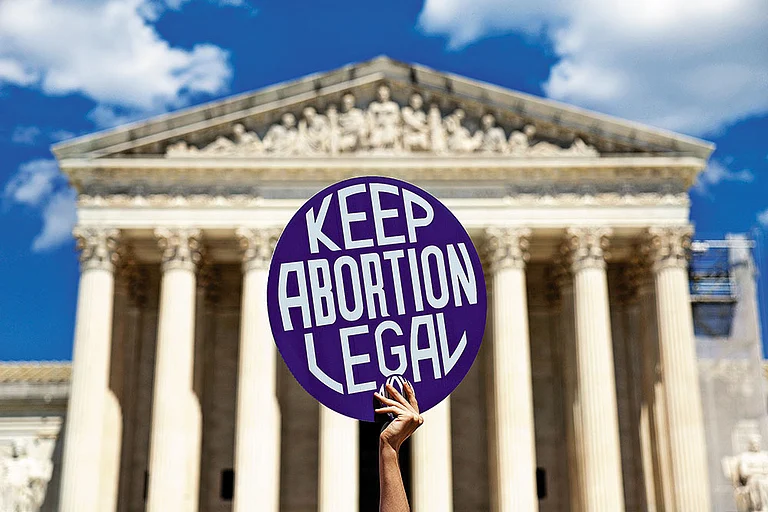This story was published as part of Outlook's 11 November, 2024 magazine issue titled 'Whitewash'. To read more stories from the issue, click here
Memory is rather an inconvenient thing for politics. Not long ago, I remember, Vice-President Kamala Harris, the Democratic nominee, was known as a champion for immigrant rights in the Senate, and even later during her 2020 presidential bid. At the time she, like her party, embraced an unequivocally pro-immigrant stance. They defined their immigration platform in opposition to the policies of former President Donald Trump’s first term—separating families detained at the border, a travel ban on Muslim-majority countries and efforts to gut the asylum system among them.
In 2020, when Harris was campaigning to get the party nomination, I was dating a left-leaning American activist who would particularly talk about the immigrant-friendly positions Harris took to allow undocumented immigrants to apply for driver’s licenses, qualify for free tuition at some universities, or even public health insurance under a universal plan.
I moved to the United States in 2018—a year after I got death threats in India for my reporting. As someone who had gotten a scholarship to attend Columbia University’s journalism school, it was my second and last year in the US on a student visa. I had no idea what I would do once the visa expired. I was totally new in the country and wasn’t sure if I would get a permanent job that could offer me an H1B1 sponsorship. But I looked at the US as my refuge.
Anxious as I was about my uncertain visa situation, listening to Harris was heartwarming for me. Not that I was thinking of becoming an illegal or undocumented immigrant, but I had told myself that I would not go back to India.
So, when Biden nominated her as his vice-presidential candidate, we talked about the symbolic significance of the historic moment. As Sangay Mishra, who teaches political science at the Drew University, writes: “Kamala’s candidacy brought together multiple marginal identities—a Black woman with an Indian mother and a Jamaican father—into the national conversation at a critical juncture in American politics and offered a powerful symbolic counterpoint to the politics of White racial resentment.”
Harris also, in a way, represents a critical moment in the history of immigration and citizenship in the US—the one of exclusion and discrimination. These policies did not allow Asians and South Asians to be US citizens until 1952. The idea that foreign-born, non-White people are not sufficiently “American” was at the core of these policies.
A new study shows that undocumented immigrants paid nearly $100 billion to federal, state and local tax revenue in 2022 while many are shut out of the programmes their taxes fund.
When Shyamala Gopalan, Harris’ mother, reached the US from India as a graduate student in 1958, it was just over six years since the country had started allowing citizenship to be granted to immigrants from India and some other parts of Asia.
But as the Democratic presidential candidate, she has adopted an outlook on immigration that looks similar to Trump’s. In the final weeks of the 2024 campaign, the rhetoric coming from Harris and most Democrats is decidedly different. There’s a greater focus on border security and less emphasis on immigrants’ rights and contributions to the country.
It won’t be an exaggeration to say that the historic, first-generation candidate isn’t fighting Trump on immigration policy. She’s echoing him. In the interview with Fox News, Harris chose to shove immigrants under the campaign bus.
For instance, in the same interview, she openly demonstrated how much the Democratic party is moving right, toward the ideological centre on immigration under her candidacy. As a child of two immigrants herself, she chose not to defend the virtue of immigration or of immigrants themselves. There were no references to the nation’s immigrant roots or the value of those immigrants. Even though Harris routinely brings up the fact that she is the proud daughter of a South Indian mother and a Jamaican father, she has, so far, promised little to improve the lives of immigrant communities across the US.
Contribution of Undocumented Immigrants
Speaking for improving the lives of undocumented immigrants may not be good politics, but as it turns out, it would be great for the economy. Let’s for a moment look at how illegal immigrants contribute to the US economy. A new study shows that undocumented immigrants paid nearly $100 billion to federal, state and local tax revenue in 2022 while many are shut out of the programmes their taxes fund. Of course, the findings run counter to anti-immigrant rhetoric that undocumented immigrants are destroying social welfare programmes.
According to the study from the Institute on Taxation and Economic Policy, a left-leaning, nonprofit think tank, in at least 40 of the 50 US states, undocumented immigrants paid higher tax rates than the top one per cent of the income scale in those states.
The study, which uses estimates of undocumented immigrants’ tax contributions as of 2022, also found that undocumented immigrants would contribute $40.2 billion more per year to federal, state and local taxes if all of the undocumented population had access to work authorisation. The Institute on Taxation and Economic Policy reasoned that this boost would come from higher wages associated with employment authorisation and easier compliance with income tax laws.
The report also sheds further light on the tax revenue provided by undocumented immigrants on the state and local levels. They are paying 46 per cent of their state and local tax payments through sales and excise taxes. Six states—New Jersey, New York, California, Florida, Texas, and Illinois—were able to raise more than $1 billion each in tax revenue from undocumented immigrants, the nonprofit said.
They pay property taxes, sales taxes and federal payroll taxes taken from their wages as well as income tax returns using Individual Taxpayer Identification numbers. Despite those payroll taxes funding medicare, social security and unemployment insurance, undocumented immigrants are not eligible to enroll in and receive regular benefits from these social programmes.
Indians were the third-largest group of undocumented immigrants in the US in 2022, according to a Pew Research Centre report, with around 7,25,000 living in the country that year.
It is in view of this contribution that the Democratic Congresswoman from Illinois, Delia Ramirez, said that time has come to stop apologising for immigration. “We should be thanking them for their contribution, instead,” she said. It was interesting when she said that “in an ideal world, Harris and Walz would propose a pathway to citizenship for undocumented immigrants who have been in the United States for decades.” She points out that work permits would also provide better opportunities and meaningful protections for undocumented immigrants and their families, allowing them to stay in the country without living in fear of being deported and separated from their loved ones.
But Ramirez qualified the fulfillment of her expectation in an ideal world, and, as we know, it is not an ideal world. This world has been polluted by Trump’s propaganda and misinformation on immigrants. Trump has upped the ante on his dehumanising rhetoric about immigrants in the final stretch of the campaign. And Harris can’t afford to look weak on the border if she wants to win. That is especially true given immigration is an issue that has become crucial for the independent voters she is courting in key states.
If I am to sum up the entire issue, it is this. Broadly, Americans hold anti-immigration views. This is the political reality Democrats have had to confront ahead of the presidential election. Though crossings have come down significantly throughout 2024, more and more Americans want to see the immigration levels decrease.
Most American voters support stricter border security measures; a growing share wants mass deportation. Harris doesn’t want to look weak on the issue the majority of Americans are almost unanimous on. That will adversely affect Indians as well because they are the third-largest undocumented migrants in the US.
Most of the migrants crossing through Canada are Indian nationals. Since October 2020, U.S. Customs and Border Protection (CBP) has encountered 1,69,000 Indian migrants at the southern and northern US land borders. Although this number is smaller than that of many groups from Latin America and the Caribbean, Indian nationals represent the largest group of extra-hemispheric migrants encountered by the CBP in the past four years.
Indians were the third-largest group of undocumented immigrants in the US in 2022, according to a Pew Research Centre report, with around 7,25,000 living in the country that year, which is more than any other nationality outside the Western Hemisphere. This number is expected to increase substantially in the coming months.
While we have reasons to be disappointed by the hawkish and right wish shift in Harris’ tone on immigration, some progressives inside her party, however, see reason to believe that she would be more pro-immigrant as a president than she has been as a campaigner. They say that Republicans aren’t buying this shift in Harris’ policy views, so we, too, should not be disheartened.
Progressive members inside Harris’ party, like Pramila Jayapal, also seem to believe that while they may not endorse all of Harris’s immigration policies, they can still find ways to work together, as they used to when she was a senator. Jayapal’s comments are a reminder of why the pro-immigrant left has given Harris scope to operate against Trump.
They refer to the fact that Harris’ campaign has hired immigrant activists, including Alida Garcia, who led immigration advocacy at the immigration and criminal justice reform advocacy group FWD and Julie Chávez Rodriguez, the granddaughter of Latino civil rights activist and labour leader César Chávez. And that could suggest that her campaign is thinking about how to advance a pro-immigrant agenda within the current political environment.
(Views expressed are personal)
MORE FROM THIS ISSUE
Mohammad Ali is an award-winning journalist who divides his time between New York and London
(This appeared in the print as 'The Outrider')




































